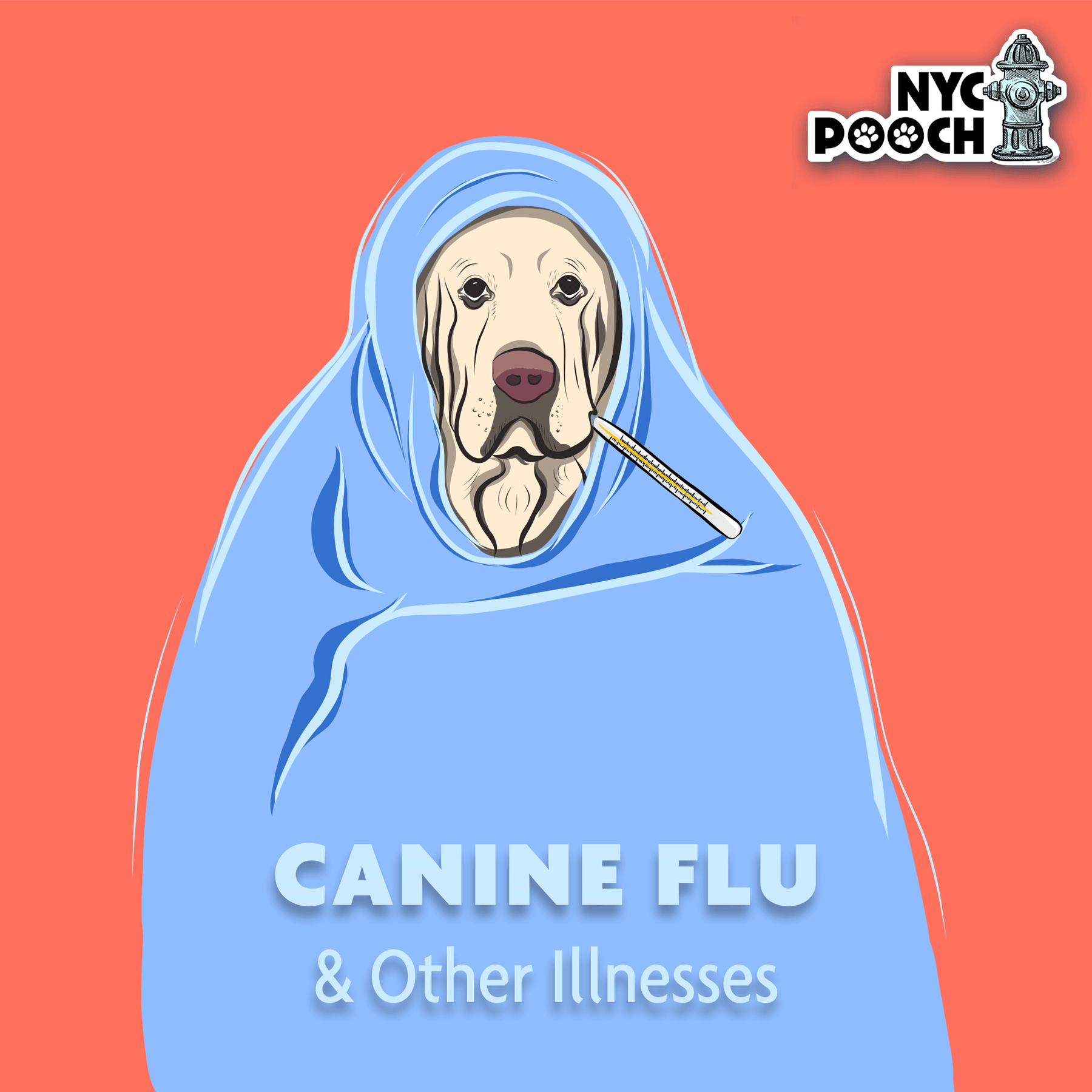Canine Flu and 5 other common illnesses to be aware of in NYC
By Dan Shemetoff
Canine Flu
Canine flu is on the rise in NYC. It’s not exactly an epidemic, but more of a slight outbreak. Still, it’s important to get up to speed so you know how to prevent it and what symptoms to look for.
- Cough
- Lethargy
- Loss of appetite
- Fever
- Discharge from nose and eyes
To prevent the flu, your dog can get a vaccine, but it may not be necessary, so talk to your vet. Keep away from other unknown dogs, especially in large groups. Also talk to your doggie daycare or other places your dog goes often to ask what they do to prevent the spread of it. It spreads through doggie slobber or snot, so if an infected pooch sneezes, coughs, or drools on your dog or a toy or surface that your dog comes into contact with, chances are good your little fuzz face will come down with it too.
Lyme Disease
Lyme disease is the most common disease transmitted through ticks. It’s a bacterial infection that is treatable with antibiotics. Only in very rare cases does it progress into something fatal.
It can be a little tricky to identify because the symptoms are similar to the flu, but there’s one main difference: swelling and/or pain around the joints and general stiffness or discomfort throughout the body. The good news is, whether it’s the flu or Lyme, you need to take your pet into the vet anyway, so you don’t need to second guess yourself. Another good piece of news: your vet can do a pretty fast in-house blood test to confirm diagnosis, so you shouldn’t have to wait long to find out what it is for sure.
The best way to prevent Lyme is to make sure your dog is always current on flea and tick prevention, whether oral or topical.
Leptospirosis
Leptospirosis is a bacterial disease that’s somewhat rare for a dog to contract, but it is a special concern for the New York area because it’s transmitted through rat (and other wildlife’s) urine. There have been a few recent cases in the NY/NJ region where dogs have contracted the disease after sniffing or drinking water contaminated with the rat urine. If not caught in enough time, it can be fatal. Puppies under 6 months are most at risk for extreme illness or death from leptospirosis.
A lot of dogs with leptospirosis–especially if they are older–can be asymptomatic. They can live normal-seeming lives for a long time with untreated mild lepto; however, it’s possible it can impact or lead to other types of chronic illness, such as kidney or liver failure.
Symptoms to watch out for are:
- Depression
- Fever
- Chills
- Muscle pain
- Lethargy
- Vomiting
- Loss of appetite
- Excessive urination
- Blood in urine
Your vet can run a blood panel to diagnose your doggo and will probably put him on a course of antibiotics to clear it up.
There is a vaccine for lepto, although it’s not effective against all strains of the bacteria, and as with any vaccine, there can be adverse effects, so consult with your vet. If you can keep your dog from drinking or swimming in unsanitary water, you should be safe.
Rocky Mountain Spotted Fever
This nasty little bacteria is also tick-borne. Symptoms can show up days or weeks after being infected, so don’t rule it out just because your dog hasn’t been in tick country lately. Here are the symptoms:
- Abnormal bleeding (such as blood in stool or urine)
- Loss of appetite
- Bruises on gums, around genitalia, or around eyes
- Lethargy
- Fever
- Joint pain and swelling
Since it’s quite similar to Lyme disease and other illnesses, your vet will have to diagnose your puppers with a full blood work up. Antibiotics and supportive care administered early enough will be all that’s needed to knock it out. But if you don’t catch it in time, it can progress into a more problematic situation. As with Lyme, the best way to prevent Rocky Mountain Spotted Fever is through regular flea and tick prevention.
Heartworm
Heartworm is transmitted through mosquitoes. Because it take awhile for a dog to start showing symptoms, young dogs usually are not diagnosed with heartworm. The symptoms of heartworm can vary depending on how long the worms have been present and how big they are, and how many there are, but generally speaking, here is what you want to watch out for:
- Soft, dry cough
- Shortness of breath
- Weakness
- Lethargy
- Nervousness
These symptoms are most noticeable after exercise or physical activity. Some dogs may become disoriented, stumble, or even faint. This is because the worms clog the heart and blood vessels leading to the heart. If not caught and diagnosed in time, heartworm can cause heart failure and death. A blood test or two is enough to diagnose your dog. Once you have a diagnosis, the course of treatment can begin, although treatment for heartworm can be complicated and risky, especially with older dogs or dogs who have more advanced stage heartworm. The treatment plan includes one or more rounds of injectable drugs to kill the adult worms, antibiotics, and total rest over the next few weeks to months as the worms decompose. Additionally, one month after the adult treatment is complete, your dog will have to have treatment for the baby worms, and hospitalization may be required. Given the severity of treatment, staying current on oral prevention is so much easier and a better investment.
Rock salt poisoning
While not a disease, the salt we use to melt ice and snow can be catastrophic for dogs. After walking over areas that were salted, dogs get salt residue on their paws, which is very painful, especially once they get inside to warmer temperatures. In an effort to find relief, they often lick their paws, which then causes the salt to get into their systems. It is very caustic, and can burn your poor pooch’s throat and digestive tract and cause dehydration. In the most severe cases, it can cause seizures and death. Here are some prevention tips:
- Keep a bowl of warm water by the door for your return and clean your dog’s feet immediately upon arrival.
- Make your dog wear booties (no guarantee he won’t act like you put live crabs on his feet, though)
- Use only safe de-icer on your own property and sidewalks
If your dog exhibits these signs, he may have ingested rock salt, and you need to get him to a vet immediately:
- Vomiting
- Diarrhea
- Lethargy
- Stumbling walk
- Excessive thirst
- Seizures or tremors
Are you seeking an outstanding dog walker in NYC? Choose our highly-rated services for unparalleled care and dedication to your cherished canine companion.



